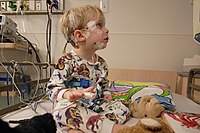
Photo from wikipedia
Aims Children on the autism spectrum are more likely to have sleep problems than non-autistic children. Sleep disturbance may exacerbate emotional and behavioral problems of children on the autism spectrum.… Click to show full abstract
Aims Children on the autism spectrum are more likely to have sleep problems than non-autistic children. Sleep disturbance may exacerbate emotional and behavioral problems of children on the autism spectrum. A better understanding of the biological mechanisms underlying sleep disturbance provide clues to better management for this co-morbid condition in autism. The goal of the current study is to identify genetic variants associated with sleep disturbance and melatonin levels in autistic children. Methods A total of 969 children on the autism spectrum were genotyped using the Global Screening Array v1 or Global Screening Array v2. Sleep problems were assessed using the Children's Sleep Habits Questionnaire (CSHQ). Melatonin levels were measured using the urine samples of 219 probands. The relationship between the melatonin level and CSHQ score was examined using the general linear model. The genetic variants associated with the CSHQ score and melatonin level as two separate quantitative traits were determined using genomewide association studies. Results The data indicates that urine melatonin levels were positively associated with CSHQ scores, suggesting that autistic children with a poorer sleep qualiy could has higher melatonin level. Furthermore, genetic assocication studies suggest that genetic pathways involved in pro-inflammatory responses might be involved in sleep disturbance, while genetic pathways involved in catecholamine-secreting PC12 cells and Schwann cells could be associated with melatonin levels. Conclusions Taken together, our findings indicate that sleep disturbance and melatonin metabolism could be attributable to distinct biological mechanisms in autistic children since they might not share genetic contributors.
Journal Title: Frontiers in Psychiatry
Year Published: 2022
Link to full text (if available)
Share on Social Media: Sign Up to like & get
recommendations!